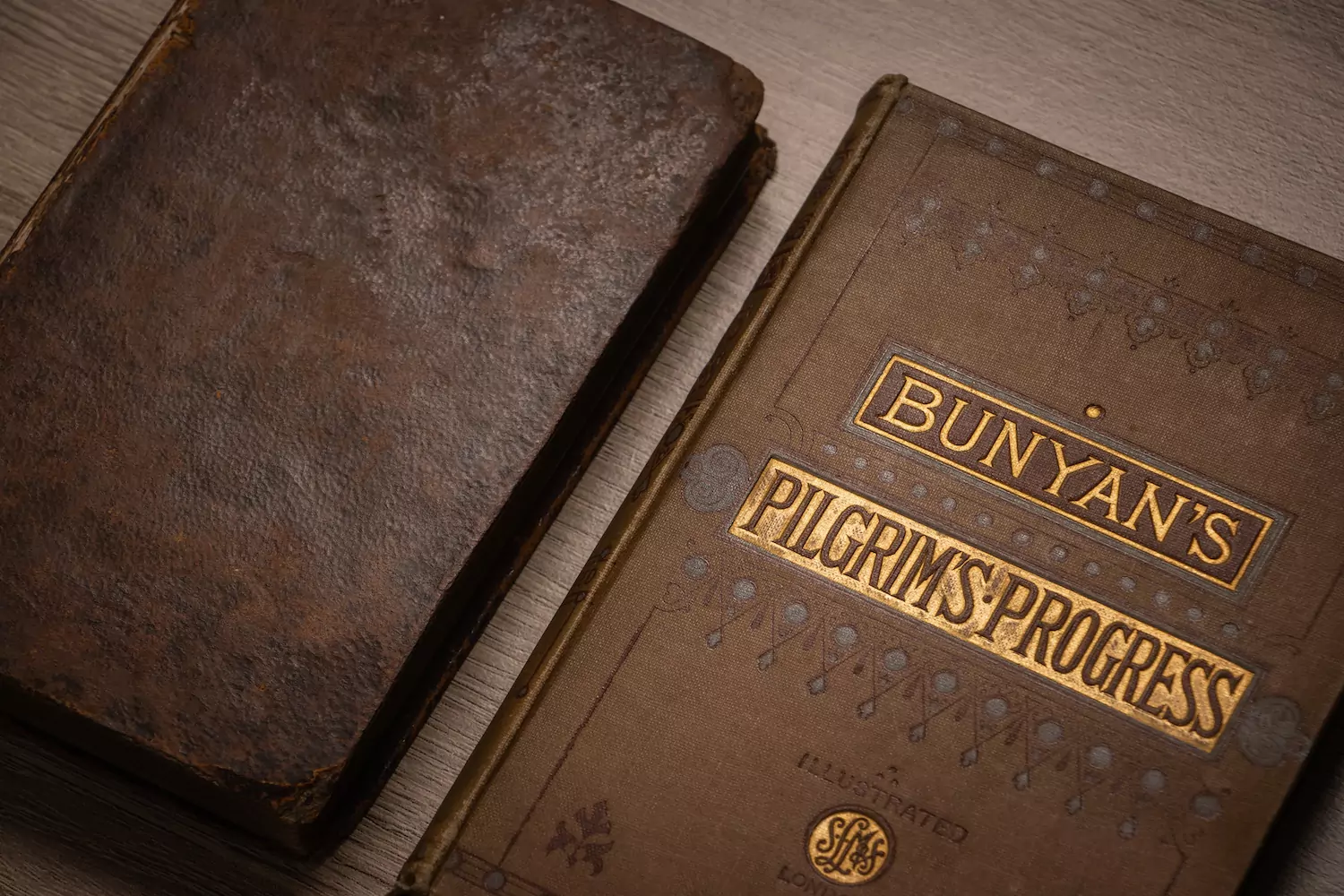10 Puritans Who Changed the World: John Bunyan, the Fearless Tinker
Who Was John Bunyan?
John Bunyan was born in 1628 at Elstow, near Bedford, to Thomas Bunyan and Margaret Bentley. Growing up in a poor family, John did not receive a good education. He was lawless, rebellious, and frequently indulged in cursing and blasphemy. However, sporadic periods of conviction of sin helped restrain some of his wickedness.
When Bunyan was sixteen years old, he joined Cromwell’s New Model Army, where he continued his rebellious ways. However, fighting in the English Civil War sobered him considerably, especially after a near-death experience. Bunyan was discharged from the army around 1646. After he returned home, he joined his father in working as a tinker. He walked the countryside, stopping at homes and farms to repair pots and other metal items.
In 1648, Bunyan married a God-fearing woman whose name remains unknown. Her dowry consisted only of two Puritan books inherited from her father—Arthur Dent’s Plain Man’s Pathway to Heaven and Lewis Bayly’s Practice of Piety. After reading these books, Bunyan was once more convicted of sin. He started attending the parish church, stopped swearing, and tried to honor the Lord’s Day. After several months, Bunyan met some poor elderly women whose joyful conversation about Christ and the new birth deeply impressed him. He mourned his joyless existence as he realized he was lost and outside of Christ. He felt he had the worst heart in all of England.
In 1651, these poor women introduced Bunyan to John Gifford, their pastor in Bedford. God used Gifford to lead Bunyan to repentance and faith. Early in his Christian life, Bunyan struggled with assurance. But “one day,” he later wrote,
As I was passing in the field, and that too with some dashes on my conscience, fearing lest yet all was not right, suddenly this sentence fell upon my soul, “Thy righteousness is in heaven”; and methought withal, I saw with the eyes of my soul, Jesus Christ at God’s right hand—there, I say, is my righteousness; so that wherever I was, or whatever I was doing, God could not say of me, “He lacks my righteousness,” for that was just before Him. I also saw, moreover, that it was not my good frame of heart that made my righteousness better, nor yet my bad frame that made my righteousness worse; for my righteousness was Jesus Christ Himself, The same yesterday, today, and forever. Now did my chains fall off my legs indeed; I was loosed from my afflictions and irons; my temptations also fled away; so that from that time those dreadful Scriptures of God left off to trouble me: now went I also home rejoicing, for the grace and love of God.
In 1655, Bunyan moved to Bedford with his wife and four children and became a member of Gifford’s church, where he was soon appointed as a deacon. His testimony became the talk of the town and led several people to conversion. That year, he began preaching to several congregations in Bedford. Hundreds of people came to hear him. He explained the Bible in ways that people could easily understand and that touched their hearts. His vivid language and personal experience made the Word of God come alive for his listeners. Over the next few years he published a number of books, establishing himself as a reputable Puritan writer.
In early 1661, Bunyan was arrested for preaching without an official license from the crown. When told that he would be freed if he would no longer preach, he replied, “If I am freed today, I will preach tomorrow.” Bunyan remained in prison for twelve and a half years with no formal charge and no legal sentence because he refused to give up preaching the gospel and denounced false teaching in the Church of England. In 1661 and from 1668–1672, however, certain jailers permitted Bunyan to leave prison to preach at times.
His prison years were trying, especially due to the pain of separation from his wife and children. These years, however, were productive for Bunyan. He wrote tirelessly and prolifically, producing dozens of his books, several of which became classics. He also preached to his fellow inmates.
In May 1672, Bunyan was released and began pastoring the Bedford congregation once again. After enjoying freedom for a couple of years, he was once more arrested for preaching and imprisoned in the town jail. Here he wrote many works, including the first part of his famous The Pilgrim’s Progress. After being released in 1677, he spent his last years preaching and writing.
Bunyan’s works have been reprinted by Banner of Truth Trust in three volumes.
What Can Pastors Learn from John Bunyan?
John Bunyan teaches pastors the importance of preoccupation with the glory of Christ and perseverance amid suffering.
Dear pastor, let the life of John Bunyan teach you to cultivate a holy preoccupation with the glory of Christ. Our preaching and ministry is worthless if it is not saturated with meditation upon and proclamation of the glory of Jesus Christ in His person and work. Christ is the sum and substance of the Scriptures (Luke 24:44). If we do not see Christ in Scripture, we do not understand Scripture at all.
Let us imitate Bunyan, who had a holy obsession with the dying love of Christ. He wrote that shortly after his conversion, “I lived for some time, very sweetly at peace with God through Christ; Oh! methought, Christ! Christ! There was nothing but Christ that was before my eyes. . . . It was glorious to me to see his exaltation . . . now I could look from myself to him, and would reckon that all those graces of God that now were green in me, were yet but like those cracked [coins] that rich men carry in their purses when their gold is in their trunk at home! Oh, I saw that my gold was in my trunk at home! In Christ my Lord and Savior! Now Christ was all.”
Second, let the life of John Bunyan teach you to persevere amid suffering. The root of perseverance is faith in Christ and constant fellowship with Him. As Bunyan once wrote, “When men do come to see the things of another world, what a God, what a Christ, what a heaven, and what an eternal glory there is to be enjoyed; also, when they see that it is possible for them to have a share in it, I tell you it will make them run through thick and thin to enjoy it.” Whenever Bunyan was promised release if he would agree to stop preaching, he refused. He said, “I have determined, the Almighty God being my help and shield, yet to suffer, if frail life might continue so long, even till the moss shall grow on mine eyebrows, rather than thus violate my faith and principles.”
Conclusion
In 1688, Bunyan died suddenly from a fever he caught while traveling in cold weather. As his friends gathered around him on his deathbed, Bunyan said, “I go to the Father of our Lord Jesus Christ, who will, no doubt, through the meditation of his blessed Son, receive me, though a sinner; where I hope we before long shall meet to sing the new song and remain everlastingly happy, world without end.” His last words were these: “My greatest desire is to be with Christ. Take me, for I come to Thee!”
Recommended Books by John Bunyan
- The Pilgrim’s Progress
- The Holy War
- Grace Abounding to the Chief of Sinners
- Come and Welcome to Jesus Christ
- The Jerusalem Sinner Saved
- All Loves Excelling
- The Acceptable Sacrifice
©2024 Joel Beeke. Used with permission.

About The Author

Joel Beeke
Joel Beeke served as president of Puritan Reformed Theological Seminary from its founding in 1995 until 2023. He is a pastor of the Heritage Reformed Congregation in Grand Rapids, Michigan, editor of the Puritan Reformed Journal and the Banner of Sovereign Grace Truth, board chairman of Reformation Heritage Books, president of Inheritance Publishers, and vice-president of the Dutch Reformed Translation Society.









